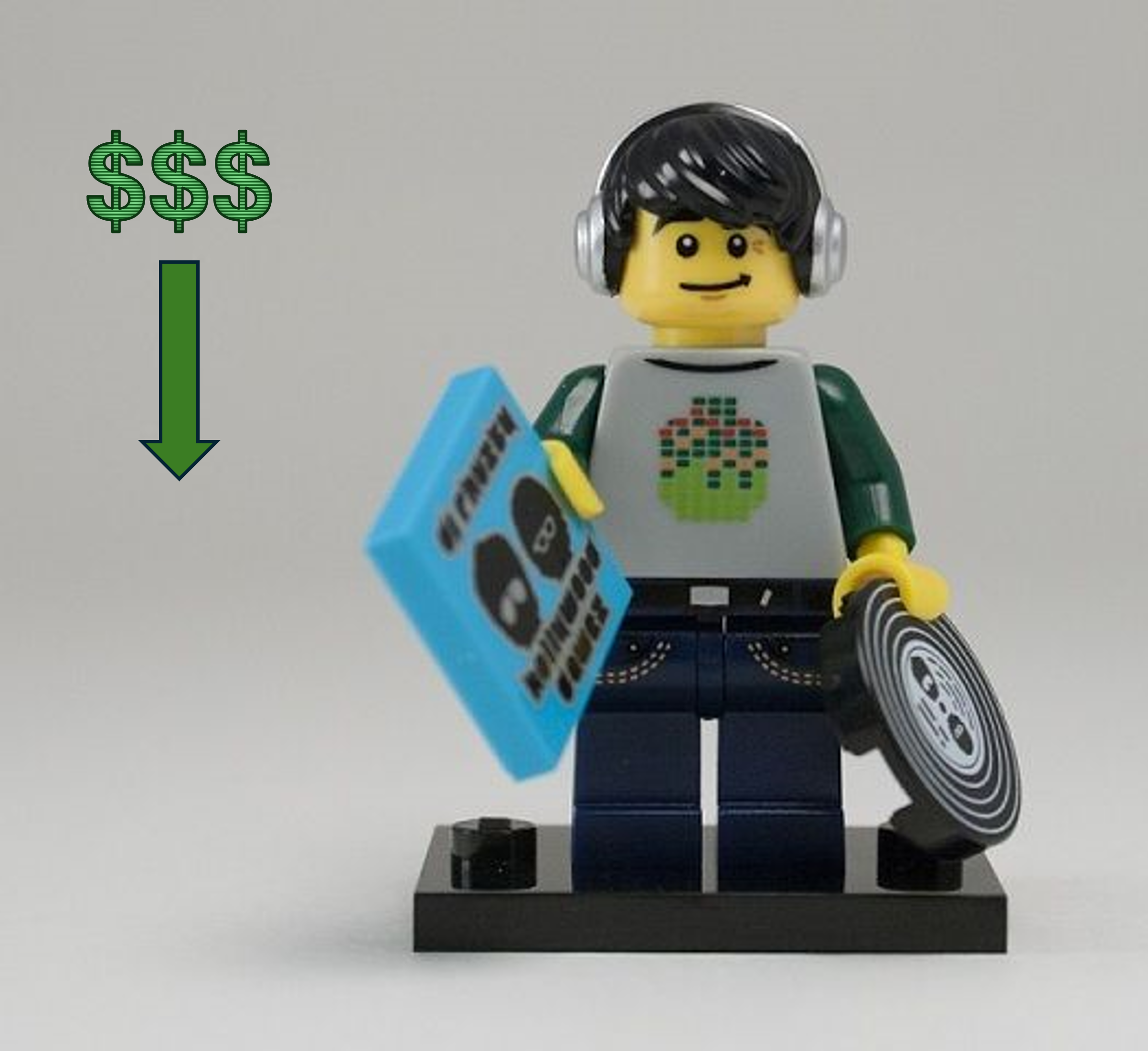
A wise man once said, “The words of the prophets (or is it “profits”) are written on the studio walls.” TV studio, that is. And you’d better believe that if it’s happening to television personalities, stars, and even icons, radio is next.
I’ve never been a strong believer in “trickle down economics,” but when it comes to radio, we’ve had to get accustomed to getting pilloried by torrents of water as a medium that rarely gets respect and often is simply overlooked and ignored in important media conversations.
In this case, key trends impacting the care, feeding, and compensation of television talent will most assuredly come to pass in radio, if they haven’t already. Chances are good your local TV stations have been systematically shaking down their news talent. The longer an anchor or sports or weather personality has been on the set, the more money they’re making, and ultimately, the more vulnerable they are to the current salary slashing trend.
Here in Detroit, a number of these TV news stars have “resigned” in the past year or two, taking “the package” rather than getting axed and receiving no severance out the door. They may put a good face on it, but the end result is the same.
Management, or better put, ownership, doesn’t have the resources or the budget to pay like they did in 1999. In the current environment, they’re content to replace the aging star with an up-and-comer – at a fraction of the cost and perks – and take their chances that revenue won’t be too affected.
And earlier this month, the highest form of this game of “compensation chicken” occurred on Today as beloved host Hoda Kotb opted out of her high-paying hosting job – reportedly in the $10-15 million vicinity – because parent NBC refused to cough up the money.
As a new round of contract negotiations approached, Hoda Kotb was facing a significant pay cut in a salary now estimated in the $10 million-$15 million-a-year range.
While it was Kotb’s call to leave “Today,” the pay cut may have accelerated her timeline. https://t.co/n1kS8A1FBx
— Variety (@Variety) October 16, 2024
Variety recently covered the situation well – just another brick in this wall that is telling talent they’re simply not worth the money in today’s media economy. In “Anchors Away! Why TV’s Top New Stars Are Taking Cuts – or Heading for the Exit,” Michael Schneider discusses how big broadcasters have come to believe that high-priced legacy talent can be replaced without incurring collateral ratings damage.
Schneider refers to it as “TV’s new austerity,” but radio people will tell you there’s nothing new about it. And the trend is spreading, including sports television in general, and ESPN specifically.
Of course, management’s side of the story is compelling, too. Schneider points out the reality we’ve seen brewing in radio for several years now. Audiences for linear media – TV and radio – have been aging while younger generations have embraced social media for news and entertainment. It has become challenging, if not impossible, for an organization’s sales and revenue arm to recoup the big bucks going out to premium talent.
 The virus has also spread to CNN where newly minted CEO Mark Thompson is reportedly about to wield the compensation axe on some of his talent. A story last week in The Ankler by Lachlan Cartwright refers to the trend as “Star Salary Beheadings,” reportedly already impacting the pay envelopes of cable stars such as Jake Tapper and Wolf Blitzer.
The virus has also spread to CNN where newly minted CEO Mark Thompson is reportedly about to wield the compensation axe on some of his talent. A story last week in The Ankler by Lachlan Cartwright refers to the trend as “Star Salary Beheadings,” reportedly already impacting the pay envelopes of cable stars such as Jake Tapper and Wolf Blitzer.
Just when you think you know where I’m going here, let me throw you a couple of curve balls. Not everyone is viewing these cuts as a way to just improve the bottom line. Some are rethinking the entire efficacy of the operation itself.
While the VP of news at Graham Media Group, Sean McLaughlin, acknowledges that “anchor economics” are no longer feasible in today’s TV newsrooms, he strongly suggests the need for a philosophical revolution in the way news is gathered, produced, and presented.
In a story in TVNewsCheck by Paige Albiniak, McLaughlin describes news teams sans pretty (and pricey) anchors who sit majestically on a glossy set taking turns reading stories, the newsroom of the future would seek out “multimedia journalists on the ground.”
McLaughlin reinforces the need for TV stations to focus on local, but suggests trashing an old, antiquated, and bloated format in exchange for a more agile brigade of “content gatherers.”
Of course, the new format is one heckuva lot cheaper as Scripps recently is proving with a newly-defined local news effort. A story in NextTV by Jon Lafayette last month laid out a plan of action that also relies on versatile multimedia journalists who dig into local markets to develop news stories.
The Scripps plan adds 250 journalists to its many local newsrooms by the end of the year. Even small market news teams will have a minimum of 10 reporters; bigger metros will have staffs of at least 25 news gatherers.
The other shoe – perhaps steel-toed work boot – dropped about a week after the above story broke. Scripps eliminated more than 200 jobs when they scrapped their 24/7 national news programming platform. While the move reaffirms the company’s commitment to local news, cuts of this magnitude indicate that all bets are off when it comes to how media organizations are now operating.
 But the most ironic piece of this story comes from the Harvard Business Review. Earlier this month, their “take on all these pink slips is a research study: “The Long-Term Cost of Layoffs” by Didier Elzinga and Amy Lavoie.
But the most ironic piece of this story comes from the Harvard Business Review. Earlier this month, their “take on all these pink slips is a research study: “The Long-Term Cost of Layoffs” by Didier Elzinga and Amy Lavoie.
The researchers interviewed 146 companies that instituted layoffs from early 2020 through late 2022. Whether you’re a worker or the boss, this is a good read.
The authors end their research paper with five key findings that may resonate with your experience – or not. I’m quoting them verbatim:
- Be realistic in your expectations and expect engagement and company confidence to take a long-term hit. The takeaway here is that while layoffs will produce a better bottom line in the short run, it may be challenging to heal the operation and expect strong results from the staff still in place.
- Focus on how the change is communicated from the outset. Not surprisingly, the authors stress the importance of transparency as a way for the company to get past the shock of layoffs.
- Don’t try to do more with less. This point may be the least realistic of the group for everyone who has remained on-board after others have lost their jobs. I’ve talked about the “too many hats” as an obvious problem in most of the places where layoffs have occurred.
- Treat people humanely in the off-boarding process. I will
 leave this part of the conversation to those of you on the ground, either in talent or in management positions. Rather than cutting off a TV anchor or a radio midday host, the opportunity to say goodbye – to both fellow staffers and loyal audiences – can be good not only for the departing ex-employee but also those who remain doing their jobs, as well as the audience. It requires two-way trust, a factor often missing during these tense moments.
leave this part of the conversation to those of you on the ground, either in talent or in management positions. Rather than cutting off a TV anchor or a radio midday host, the opportunity to say goodbye – to both fellow staffers and loyal audiences – can be good not only for the departing ex-employee but also those who remain doing their jobs, as well as the audience. It requires two-way trust, a factor often missing during these tense moments. - Recognize that relationships outlive employment contracts. This last point is acknowledgment that the end of these relationships – often long ones – between the company and talent are hard on everyone. The opportunity to grieve can be essential. As advisor to the HBR team, Esther Perel, adds, “Sometimes layoffs are unavoidable. Sometimes they are essential to the survival of the business — and the thriving of the remaining employees. But even so, companies would do well to remember that when people leave a job they are also leaving the colleagues they’ve worked side by side with — virtually or in person — for years.”
That may be the right note on which to leave the final word to you in the “Comments” section of this post and/or on my socials.
This trend in TV is making the headlines, but its effects are being felt just as poignantly in the radio business.
Salary cuts and even terminations are more than just spreadsheet adjustments. They impact other employees and audience members, and they can have their effect on the brand strength, depending on whether management handles it deftly or ham-handedly.
Both sides have major, life-changing decisions to make – how much to compromise, whether to accept a new status quo, or to pack up the cardboard box and walk out the door.
compromise, whether to accept a new status quo, or to pack up the cardboard box and walk out the door.
These are moves that are heavily nuanced, an opportunity for management, ownership, and of course, talent to play it with anger and vitriol or with grace and empathy.
It cuts both ways.
- Is It Time For Radio to WAKE UP?! - June 1, 2025
- For Radio, The Perils Of Rebranding - May 30, 2025
- There’s No Failure In Radio - May 29, 2025




Whether it’s radio or TV, the amount of institutional knowledge and local context that walks out the door when a long-time employee leaves isn’t easy to measure on a spreadsheet. The impact is lessened if the anchor or host has been siloed (or siloed themselves) and hasn’t contributed to the development of newer and younger employees.
The aging of talent in both radio and TV is a product of management trying to maximize short-term income at the expense of building a product that younger audiences can or will relate to. Where are the new formats, and formatics, that have a chance of attracting the lower end of the demographic pie? Maybe if broadcasters, both radio and TV, should start using some of those “auxiliary” channels that deliver “station in a box” content or act as “flankers” as outlets for experimenting with new approaches to media. Turn those low-rated stations over to young broadcasters and let them try something new. It sure beats just watching an entire medium wither as it circles the drain, and it just might make it more profitable.
A lot of good questions here, Brian. thanks for laying them out. Something new and different on the radio would be a welcome change.
Sure it comes with the territory, but it’s always that first firing that stings the worst.
April 3 1989, WHEN(AM) Syracuse NY, after only eleven months.
Still bugs me a full 35 years later.
I think you spoke for a lot of people with that kicker, Alan. No matter how successful we become, that first firing stays with you. I heard (Morning) Joe Scarborough interviewing Jimmy Kimmel the other morning. Joe asked Jimmy about his radio career. Kimmel went right to the time he was fired from his first-ever radio job in Seattle less than a year into the show. It’s hard to shake those losses.
Elon cut 80% of the Twitter workforce and bragged that it’s still running perfectly. Of course it is not. But everyone is a copycat. So tech companies did massive firings because Elon did it. Many have hired back because that experiment failed. Copycat-ism. Elon did it so we will. But X is private so you can’t see that advertising is 1/4th of what it was.
Steve Jobs was celebrated as an over-the-top tough guy for a year when Apple first regained it’s success. Copycatism returned as some CEOs raised their hands that they too needed to become jerks to lead because of Steve. (That wasn’t the reason for his success. His great products…..his content was.)
If former president Trump does what he said about making Musk his consultant to kill massive amount of government jobs, this trend will shortly trickle down to business again. It’s going to be cool again to gut your talent pool. Buckle up.
But if you gut your actual content and go from being in the entertainment business to transmitter operator there is no reason for folks to listen.
Jim, that copycatism you speak of has always been a powewrful force in radio. When Mel Karmazin added more and more units at his Infinity stations, the rest of radio jumped over the cliff with him. Ater all, “if Mel is getting away with it.” Businesspeople are always looking for permission to break a rule here and there in order to bolster the bottom line. It’s just business, right? Your last line says it all.
With Scripps, there are also some bigger would’ve/could’ve/should’ve’s at play: Did it pay too much to buy Ion Media? And, might it have been better to have kept Newsy (now Scripps News) available via what was Retirement Living TV? (Just in case, the official shutdown might still be scheduled for mid-November.)
Still, the biggest irony for me is that the shutdown was one of the last stories covered on the Next TV site–which itself pretty much shut down soon after (although I think it was part of a previously planned/announced move)…
https://www.nexttv.com/news/publishers-message
There are a lot of far-reaching, macro decisions being reached by companies that have grown weary of the red ink. Looking back on the past several years, a lot of less-than-great decisions about acquisitions and startups have been made. Business has to aim or higher battling averages or the losses will continue.
These are painful words-yet realistic, Fred. I think I’m smart enough to come up with several hundred reasons we’re in this pickle, but there would be 300 more out there somewhere. We are smart, but we’re not the ones driving the bus. Those behind the wheel are oblivious to the solutions as it may affect their immediate compensation. There’s also the fact that where once we had dozens of entertainment sources and choices there are now hundreds of thousands. It’s affecting the media landscape and we’re kinda lost as to finding the solutions from our level. We will keep up the fight, though.
Of that, I have no doubt, Dave. But I can’t help but wonder whether we’re continuing to operate our buggy whip stores while cars and zipping up and down freeways. More choice and disruption are critically powerful forces.
Had the horse down to one grain of oats a day and then it went and died on me.
Hah. Funny, not funny.
I’ve fallen victim to transition more than once. It hurt each time. For the most part, it was done in a way that allowed me to keep my dignity. You know what? They all thrived without me.
But, that has changed. I’m watching from the sidelines, and I notice a lot of talent and experience going out the door. Is it for the better? Is it part of a new strategy, or is it about “net to the bottom line?” I sure hope not.
Sadly, I think the bottom line concerns run so deep that more and more radio comppanies and organizations are tossing babies out with the bath water. Having a good quarter (especially public companies) is the priority, even if means the brand takes a step (or tow or three) backwareds. Good ot hear from you, Kim.
Spend some time on TikTok and get an idea where TV news is headed. On-set talent have their smart devices by their side live streaming their between-story off-camera patter and commentary along with their on-camera work. They’re also going out solo to cover stories, shoot their own video, and edit their packages. And it’s all infinitely more entertaining and enlightening than the old stentorian Kent Brockman/Ted Baxter model.
Steve, it is more entertaining, electric, and faster-paced. TV news is being reinvented by technology. But radio?